The Ultimate Guide to Essential Car Detailing Tools: Achieve Professional Results with the Right Equipment
Car detailing is an essential part of maintaining the appearance and value of a vehicle. Detailing involves cleaning, polishing, and protecting a car's interior and exterior surfaces . To achieve the best results, it is important to have the right tools and equipment. In this article, we will explore the best car detailing tools that every car enthusiast and professional detailer should have in their arsenal.
The best car detailing tools include a variety of items such as pressure washers, steam cleaners, microfiber cloths, and vacuum cleaners. These tools are essential for cleaning and maintaining a vehicle's exterior and interior surfaces. Other essential tools include foam cannons, water deionizers, dry vapor steamers, air compressors, wet-dry vacuums, hot water extractors, plastic razor blades, car detailing brushes, and washer/sanitizer buckets. There are also a variety of accessories and supplies that can enhance the detailing process, such as LED auto detailing lights, ozone generators, pump sprays, bucket organizers, clay bars, microfiber towels, and car vacuums.
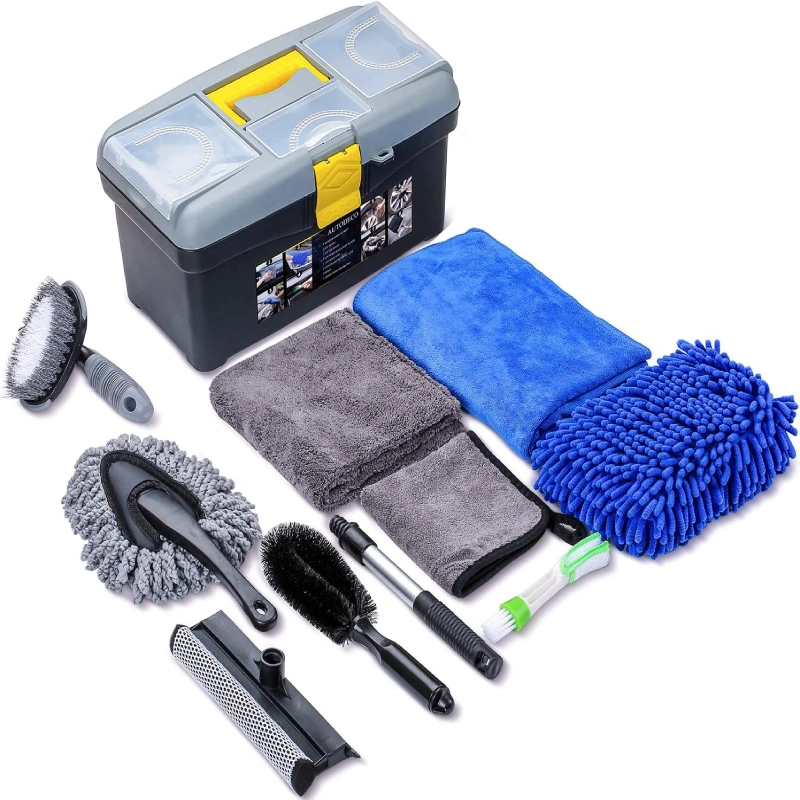
Key Takeaways:
- Essential car detailing tools include pressure washers, steam cleaners, microfiber cloths, and vacuum cleaners.
- Detailing accessories like LED auto detailing lights, ozone generators, and bucket organizers can enhance the detailing process.
- Advanced detailing tools like dry vapor steamers, hot water extractors, and foam cannons are also useful for achieving professional results.
Essential Car Detailing Tools
When it comes to car detailing, having the right tools is essential to achieve the best results. Here are some of the most important tools that every car detailer should have in their arsenal:
1. High-Quality Microfiber Towels
Microfiber towels are essential for detailing because they are soft, absorbent, and gentle on surfaces. They are perfect for wiping down surfaces, removing wax, and polishing. It is important to use high-quality microfiber towels because lower quality towels can leave behind lint and scratches.
2. Professional-Grade Vacuum Cleaner
A professional-grade vacuum cleaner is a must-have tool for any car detailer. It is important to choose a vacuum that is powerful enough to remove dirt and debris from carpets and upholstery. A vacuum with a HEPA filter is also a good choice because it can remove allergens and other particles from the air.
3. Dual-Action Polisher
A professional-grade vacuum cleaner is a must-have tool for any car detailer. It is important to choose a vacuum that is powerful enough to remove dirt and debris from carpets and upholstery. A vacuum with a HEPA filter is also a good choice because it can remove allergens and other particles from the air.
4. Car Detailing Brushes
Detailing brushes are essential for cleaning hard-to-reach areas of the car, such as air vents, grilles, and door jambs. They are also great for cleaning wheels and tires. It is important to choose brushes that are made from soft bristles to avoid scratching the surface of the car. Overall, having these essential car detailing tools will make the job easier and help achieve the best results.
Cleaning Solutions and Chemicals
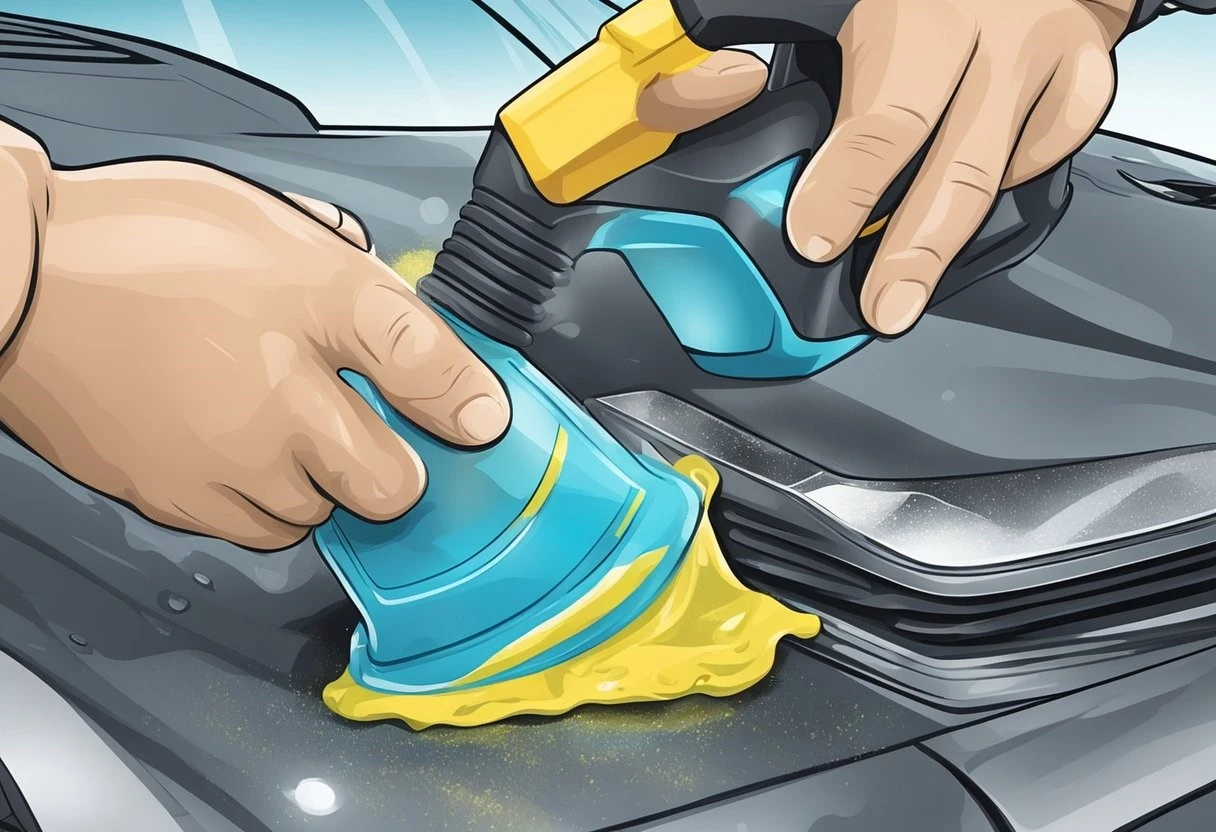
Detailing a car requires the use of cleaning solutions and chemicals to remove dirt, grime, and stains from various surfaces. Here are some of the most commonly used cleaning solutions and chemicals:
5. pH-Neutral Car Shampoo
A pH-neutral car shampoo is a must-have in any detailing kit. It is gentle on the car's paint and does not strip off any wax or sealant. A pH-neutral shampoo helps to remove dirt and grime without leaving any residue behind. Some of the best pH-neutral car shampoos include Meguiar's Gold Class Car Wash, Coating Daddy Car Shampoo, Chemical Guys Mr. Pink, and Griot's Garage Car Wash.
6. Wheel Cleaner
Wheels are one of the dirtiest parts of a car, and they require a specialized cleaner to remove brake dust, dirt, and grime. A good wheel cleaner should be safe for all types of wheels, including painted, polished, and chrome wheels. Some of the best wheel cleaners include Sonax Wheel Cleaner, Coating Daddy Wheel Cleaner, Chemical Guys Diablo Wheel Gel, and Meguiar's Hot Rims All Wheel Cleaner.
7. Glass Cleaner
A good glass cleaner should be streak-free and leave no residue behind. It should also be safe for tinted windows. Some of the best glass cleaners include Stoner Invisible Glass, Meguiar's Perfect Clarity Glass Cleaner, and Chemical Guys Signature Series Glass Cleaner.
8. Leather Conditioner
Leather seats require special care to keep them looking their best. A good leather conditioner helps to moisturize and protect the leather from drying out and cracking. Some of the best leather conditioners include Leather Honey Leather Conditioner, Meguiar's Gold Class Leather Conditioner, and Chemical Guys Leather Conditioner.
It is important to choose high-quality cleaning solutions and chemicals to ensure that they do not damage the car's surfaces. Always follow the manufacturer's instructions when using these products.
Advanced Detailing Equipment
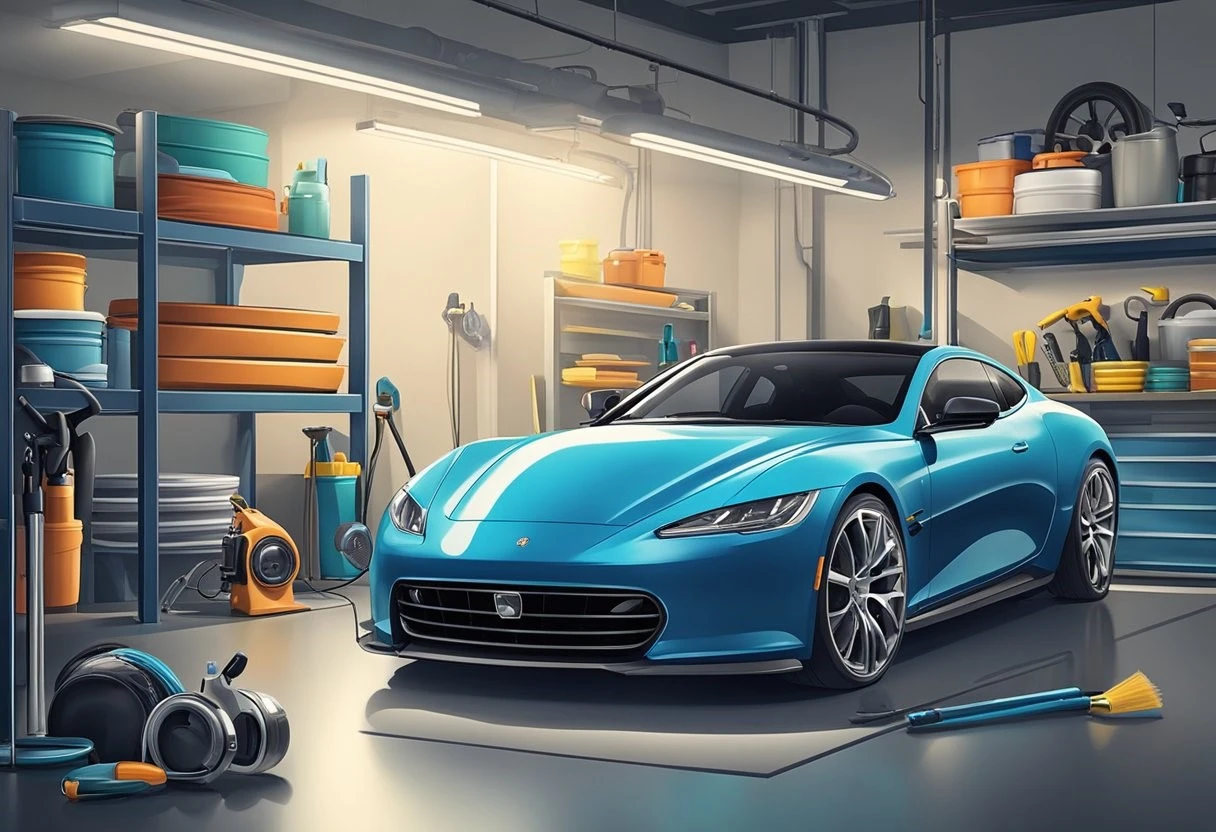
When it comes to advanced detailing equipment, there are several tools that can help take your detailing business to the next level. Here are some of the most important tools to consider:
9. Steam Cleaners
Steam cleaners are a great tool for removing dirt and grime from a variety of surfaces, including carpets, upholstery, and leather. They use high-pressure steam to clean and disinfect surfaces without the need for harsh chemicals. One of the best steam cleaners on the market is the Fortador Pro Plus , which can heat water up to 327 degrees Fahrenheit and has a pressure of up to 145 psi
10. Ozone Generators
Ozone generators are a powerful tool for removing odors from vehicles. They work by producing ozone, which reacts with and neutralizes odors at the molecular level. One of the best ozone generators on the market is the Enerzen Commercial Ozone Generator , which can cover up to 4,000 square feet and has a timer function for precise control.
11. Pressure Washers
Pressure washers are an essential tool for removing dirt and grime from the exterior of vehicles. They use high-pressure water to blast away dirt and debris, making it easier to clean the surface. One of the best pressure washers on the market is the Sun Joe SPX3000, which has a maximum pressure of 2030 psi and comes with five quick-connect nozzles for versatile cleaning.
12. Paint Thickness Gauges
Paint thickness gauges are a useful tool for measuring the thickness of paint on a vehicle. They can help you identify areas where the paint is too thin or has been damaged, making it easier to avoid causing further damage during the detailing process. One of the best paint thickness gauges on the market is the Coating Daady gauges ,which can measure both ferrous and non-ferrous substrates and has a range of 0~1350μm.
By investing in these advanced detailing tools, you can provide your customers with a higher level of service and achieve better results in less time.
Detailing Accessories
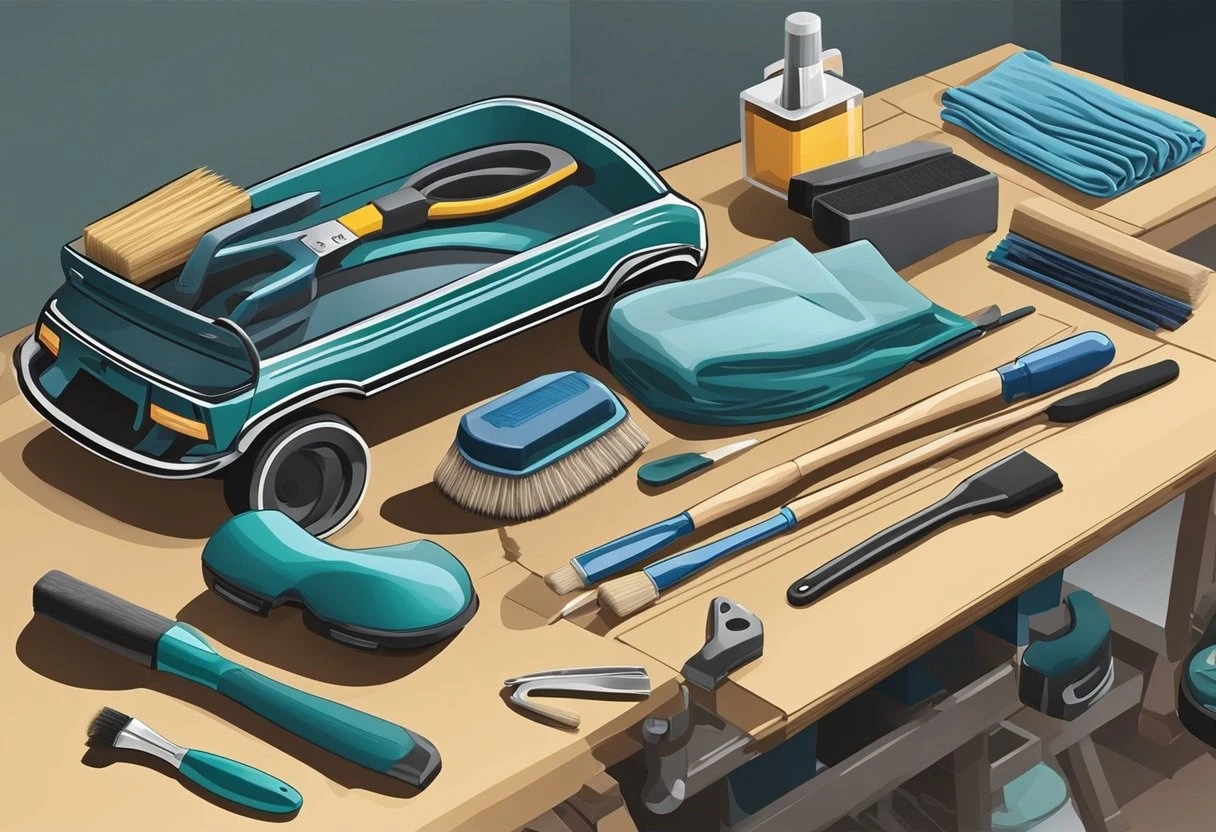
When it comes to detailing a car, having the right accessories can make all the difference. Here are some of the most important detailing accessories to consider:
13. Grit Guards
Grit guards are an essential tool for preventing scratches and swirl marks during the washing process. These plastic inserts fit into the bottom of a wash bucket and help to trap dirt and debris at the bottom of the bucket, away from your wash mitt or sponge.
14. Drying Aids
Drying aids are products that help to speed up the drying process and prevent water spots. These products can come in the form of sprays or waxes and are applied to the surface of the car after washing and rinsing.
15. Detailing Clay
Detailing clay is a soft, pliable material that is used to remove contaminants from the surface of the car. This can include things like tree sap, tar, and brake dust. Detailing clay is typically used after washing the car but before waxing or sealing.
16. Car Dusters
Car dusters are a quick and easy way to remove dust and debris from the surface of the car. These products are typically made from microfiber or synthetic fibers and can be used on both the interior and exterior of the car.
Overall, having the right detailing accessories can make the detailing process quicker and more effective. Other essential tools to consider include foam cannons, microfiber towels, pressure washers, and car detailing brushes. With the right tools and accessories, anyone can achieve a professional-level detail job.
Interior Detailing Techniques
Keeping the interior of the car clean is essential for a comfortable and healthy driving experience. Here are some techniques that can help in achieving a spotless interior:
17. Carpet and Upholstery Cleaning
Regular vacuuming is the first step in maintaining the cleanliness of carpets and upholstery. For deep cleaning, a hot water extractor or a steam cleaner can be used. These tools can help remove dirt, dust, and stains from the fabric. It is important to use a cleaning solution that is specifically designed for car interiors to avoid damaging the material.
18. Dashboard and Console Care
The dashboard and console are often overlooked during cleaning, but they can accumulate a lot of dust and grime over time. A microfiber cloth can be used to wipe down the surface, followed by a cleaning solution to remove any remaining dirt. It is important to avoid using harsh chemicals as they can damage the plastic and vinyl surfaces.
19. Stain Removal Strategies
Stains on carpets and upholstery can be unsightly and difficult to remove. For liquid stains, a clean cloth can be used to blot the area, followed by a cleaning solution. For stubborn stains, a carpet and upholstery cleaner can be used. It is important to test the cleaner on a small, inconspicuous area before applying it to the stain.
20. Odor Elimination
Unpleasant odors can be a common problem in car interiors. To eliminate odors, an odor eliminator spray can be used. It is important to choose a product that is specifically designed for car interiors and to follow the instructions carefully. Airing out the car by opening the windows can also help in eliminating odors.
Overall, having the right tools and techniques can make interior detailing a breeze. Using high-quality tools like microfiber cloths, carpet extractors, and steam cleaners can help in achieving a professional-level clean.
Exterior Detailing Methods
When it comes to exterior detailing, there are several methods that can help you achieve a clean and polished look. Here are some of the most important methods to consider:
Paint Decontamination
Before applying any wax or sealant, it's important to decontaminate the paint surface. This involves removing any contaminants such as dirt, grime, and tar that may have accumulated on the surface. One effective method for paint decontamination is to use a clay bar. Clay bars are gentle on the paint surface and can help remove contaminants that are not visible to the naked eye. To use a clay bar, simply lubricate the surface with a detailing spray and gently rub the clay over the surface until it feels smooth.
Waxing and Sealing
Once the paint surface has been decontaminated, it's important to protect it with a wax or sealant. Waxing and sealing can help protect the paint from UV rays, environmental contaminants, and other factors that can cause damage over time. There are many different types of waxes and sealants available, each with their own benefits and drawbacks. Some popular options include carnauba wax, synthetic wax, and ceramic coatings.
Tire and Wheel Maintenance
Tires and wheels are often overlooked when it comes to detailing, but they can have a big impact on the overall appearance of the vehicle. To keep tires looking their best, it's important to clean and protect them regularly. This can be done using a tire cleaner and protectant. For wheels, it's important to choose a cleaner that is safe for the type of wheel finish you have. Some popular options include acid-free wheel cleaners and all-purpose wheel cleaners.
Headlight Restoration
Over time, headlights can become cloudy and yellowed, which can reduce visibility and detract from the overall appearance of the vehicle. Headlight restoration involves removing the outer layer of the headlight lens to reveal a clear, shiny surface. This can be done using a headlight restoration kit, which typically includes sandpaper, polishing compound, and a sealant.
Overall, these methods can help you achieve a clean and polished look for your vehicle's exterior. By using the right tools and techniques, you can keep your vehicle looking its best for years to come.
Detailing Safety and Best Practices
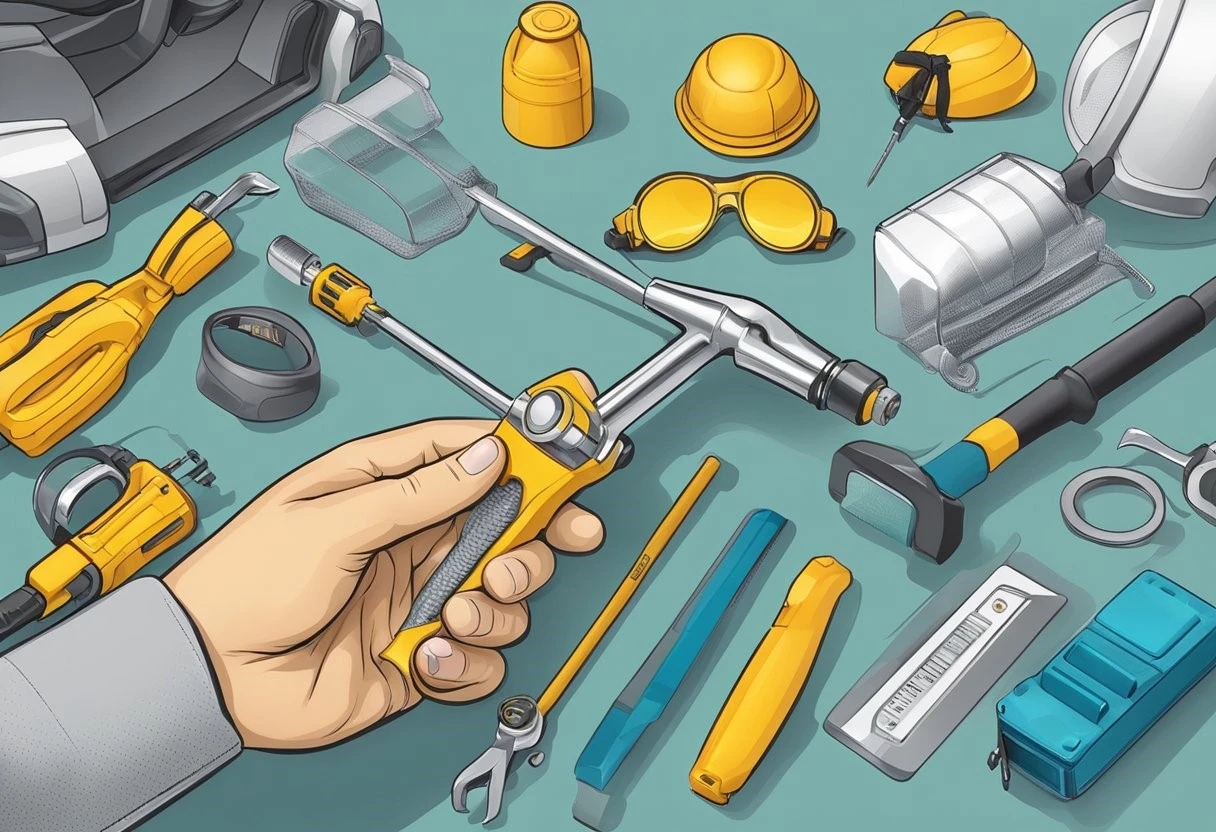
Detailing a car can be a rewarding experience, but it's important to prioritize safety and best practices to ensure a successful outcome. In this section, we'll explore the proper use of chemicals, equipment maintenance, ergonomics and efficiency, and environmental considerations.
Proper Use of Chemicals
Chemicals are a crucial component of car detailing, but they can also be hazardous if not used properly. Detailers should always read the label and follow the manufacturer's instructions carefully. It's also important to wear protective gear, such as gloves and eye protection, when handling chemicals. Detailers should also avoid mixing chemicals, as this can create dangerous reactions.
Equipment Maintenance
Maintaining equipment is essential for ensuring optimal performance and longevity. Detailers should clean their equipment after each use and inspect it regularly for signs of wear and tear. It's also important to store equipment properly to prevent damage and ensure it's ready for use when needed.
Ergonomics and Efficiency
Detailing can be physically demanding work, so it's important to prioritize ergonomics and efficiency. Detailers should use tools and equipment that are comfortable to hold and use, and they should take frequent breaks to prevent fatigue. It's also important to work efficiently to maximize productivity and minimize the risk of injury.
Environmental Considerations
Car detailing can have an impact on the environment, so it's important to consider the environmental impact of the products and techniques used. Detailers should choose environmentally friendly products whenever possible and dispose of waste properly. They should also be mindful of water usage and avoid using excessive amounts of water when washing cars.
Overall, prioritizing safety and best practices is essential for successful car detailing. By following these guidelines, detailers can achieve optimal results while minimizing the risk of injury and environmental impact.
How to Use Car Detailing Tools
Properly using car detailing tools is crucial for achieving the best results. Here is a guide on how to use some of the most essential car detailing tools, including pressure washers, clay bars, microfiber towels, and polishers:
Pressure Washers:
- Start by filling the pressure washer with water and adding any cleaning solutions or detergents recommended by the manufacturer.
- Begin by holding the nozzle at least 2 feet away from the surface you're cleaning and work your way closer as you become more familiar with the tool.
- Move the nozzle in a back-and-forth motion, starting at the top of the vehicle and working your way down.
- Use a lower pressure setting when cleaning sensitive areas like the windows and mirrors.
- Once you've finished cleaning, rinse the vehicle with clean water to remove any remaining soap or dirt.
Clay Bars:
- Start by washing the vehicle thoroughly to remove any loose dirt or debris
- Knead the clay bar in your hand to soften it, then flatten it out.
- Spray the surface you're working on with a clay lubricant, such as a clay bar lubricant spray, then gently rub the clay bar over the surface in a back-and-forth motion.
- Use a clay bar on one section of the vehicle at a time, then wipe it clean with a microfiber towel.
- Repeat the process on all surfaces of the vehicle.
Microfiber Towels:
- Start by wetting the microfiber towel with water or a cleaning solution.
- Use a gentle, circular motion to wipe the surface you're cleaning, making sure to overlap your strokes to ensure that you're not missing any spots.
- When cleaning the exterior of the vehicle, use one towel for the body and a separate towel for the wheels and tires.
- When cleaning the interior of the vehicle, use one towel for the dashboard and another for the upholstery.
- Make sure to wash your microfiber towels after each use to remove any dirt and debris.
Polishers:
- Start by washing the vehicle thoroughly to remove any loose dirt or debris.
- Apply a small amount of polishing compound to the surface you're working on.
- Turn on the polisher and begin working on the surface in a back-and-forth motion, making sure to overlap your strokes to ensure that you're not missing any spots.
- Use a lower speed setting when working on sensitive areas like the windows and mirrors.
- Once you've finished polishing, wipe the surface clean with a microfiber towel.
It's important to follow the manufacturer's instructions when using car detailing tools and always test the tools on a small, inconspicuous area before using them on the entire vehicle. And always use proper protective gear like gloves, goggles and face mask, when using these tools to avoid any injury or damage.
Conclusion
Car detailing is an important part of car maintenance and upkeep and requires the right tools to make sure it is done properly. Pressure washers, clay bars, microfiber towels, and polishers are all essential tools that can help you get your car looking better than ever. While these items may be a bit costly at first, they will prove their worth in the long run as you’ll be able to keep your car looking great for years to come with minimal effort. While there are many other types of products available out there for car detailing purposes, these tools are essential for restoring and protecting your vehicle and preserving its resale value. With the right tools, you can keep your vehicle looking its best all year round.
See Also :
- Best Car Cleaning Service in Noida - Find the best car cleaning services in Noida and keep your car looking new.
- Unlocking the Benefits of Mobile Car Detailing - Learn about the convenience and benefits of mobile car detailing services and how it can save you time and money
- Car Detailing Products - Discover the best products for car detailing and how to use them to achieve a professional shine.
- Detailing Services for Different Cars - Learn about the different types of detailing services available for different types of cars and which one is best for you.
- Car Detailing for Different Seasons - Find out how to prepare your car for different seasons with the right detailing methods and products.
- How to clean your car’s interior - Learn the 8 best techniques and products for cleaning the interior of your car, including the seats, dashboard, and carpets.
- How to clean car exterior in 6 easy steps - Discover the best ways to wash and protect the exterior of your car, including the paint, wheels, and windows.
- Detailing vs Washing - Understand the difference between detailing and washing and how to choose the right service for your car's needs.
- Best Bike and Car Detailing Service in Delhi NCR, India

